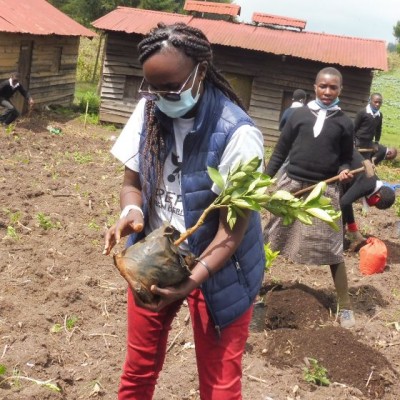The world has experienced a myriad of challenges from immemorial time. Do we still remember colonization or World War I and II? What about the global financial crisis that hit the world between the years 2008 and 2010? And just recently, the world was brought to its knees by the COVID-19 which heavily impacted our economies. All of these challenges have hit the world one after the other, but humanity has always found ways to bounce back having learned valuable lessons such as the respect of human rights, financial planning and strengthening health systems.
With all the knowledge about shared humanity and international cooperation we have gained over thousands of years, you would think that when faced with an apocalyptic crisis, the human race will band together to solve it. One would hope that when faced with irrefutable evidence that our planet is slowly dying, we would do all we can to right the wrongs that have led us down this unfortunate path. But that does not seem like the case with the climate crisis.
The climate crisis is negatively impacting the world: from Madagascar to Mali to Kenya we have seen the trail of destruction and death it has left in its wake. Month after month and year after year, communities across the world are hit by extreme weather events. It is time for the world to urgently devise sustainable solutions that will prevent the occurrence of similar catastrophes. As many campaigns have put it before: ‘It is now or never.’
Can we achieve a healthy planet?
An "Healthy environment" encompasses many factors such as accessibility to clean air, water, proper sanitation, and a clean working environment. There are many organizations, social groups, and other entities that are tirelessly working for the current and the next generations to mitigate the environmental hazards we created. These efforts should not only focus on financing climate projects but also on public mobilization for greater participation and inclusivity, including the largest population group in the world – the youth.
The political systems or governing bodies need to set a clear framework that includes the youth in top rank decision making and respects the recommendations given by them. Furthermore, it is of utmost importance to include the voices of communities at the forefront of the climate crisis.
On a practical level, living a healthy lifestyle may be linked to education. For example, one of the major causes of unhealthy environments is littering. One study highlighted that amongst the main contributors to plastic pollution is littering. Plastic waste dumped into water bodies affects human health. Therefore, having a well-structured education system and putting in place communication materials that teach individuals about the consequences of littering and proper waste disposal mechanisms, will lead to better health in the long run.
The covid-19 and Climate change.
Covid-19 has left the world with many lessons, one of them being that life is ‘fragile’ and needs ‘care’. In this context, the catastrophes in the world such as drought and climate change need urgent care to prevent further occurrences. It is unfortunate that the climate crisis is looming and needs solid attention as it may bring a crisis equal to or greater than the covid-19 pandemic.
Climate change will not be stopped by national borders, hence all countries should collaborate and fight climate change together, including by adopting sustainable practices.
Recent studies have linked corona-virus rates to environmental degradation such as air pollution. Working toward a healthy environment calls for actions - such as massive tree planting - to create or restore carbon sinks to prevent or reduce the rate at which human beings consume polluted air.
There are a number of organizations such as Kipepeo Green Heritage that have sustainable tree planting strategies which, if implemented on large scale, in the long run, will lead to a green and fruity world with sufficient carbon sinks preventing air pollution and subsequent diseases. This work should be supported and encouraged at all levels.
Enhancing Global Sustainable Goals
The United Nation’s call for the world to collaborate in achieving the SDGs has led to the emergence of a number of good practices. To accelerate the implementation of the sustainable development goals project founders should have a clear vision on how their work could contribute tackling the world’s economic, social and environmental problems, such as poverty and inaccessibility to decent health services in developing countries. Non-Profit Organizations such as Kipepeo Green Heritage are developing practices that could be benchmarked and implemented elsewhere. Specifically, Kipepeo Green Heritage aims at planting fruit trees that when harvested, will give fruits to improve nutrition, contribute to the health and wealth of communities, acting as carbon sinks and empowering the people involved through value addition and employment creation.
Outcomes of the Stockholm +50 meeting.
The theme for the Stockholm+50 meeting i.e. “A Healthy Planet for the Prosperity of all- our responsibility, our opportunity’’ is indeed key. We hope that governing bodies, institutions and researchers will present data to support the efforts made to reduce carbon emission so far. Furthermore, we expect to hear from the beneficiaries of past financial aids that were directed towards sustainable projects, it would be useful to learn whether the funds were effective and how financing could be improved in the future. Also, we expect the youth representatives in the meeting to showcase and present the recommendations given to them by their representative countries, groups or regions. We hope this meeting will fully recognize the role of youth groups in helping the global community and UNEP to achieve its environmental goals, the past challenges they have faced in terms of climate change mitigation and/or adaptation practices implementations, and their vision for a ‘green and climate-smart future.’
Further reading
I. https://en.wikipedia.org/wiki/Financial_crisis_of_2007%E2%80%932008
II. Walking Green: Ten Harmful Effects of Litter, Green Eco Services, Cathy, 2008
III. The Effectiveness of Enforcement on Behavior Change, Keep Britain Tidy, 2011
IV. What is Littering? Conserve Energy Future, Rinkesh
V. McCarthy, J. J. et al. (2001). Report of the Intergovernmental Panel on Climate Change. New York, USA: Cambridge University Press
VI. UNFCCC (UN Framework Convention on Climate Change) (2007). Climate Change: Impacts, Vulnerabilities and Adaptation in Developing Countries (p. 12). Bonn: UNFCCC.



